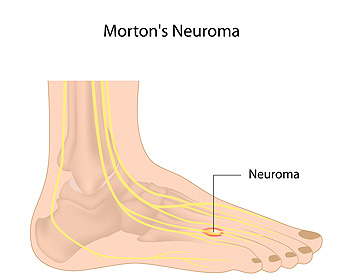Morton’s neuroma is often caused by high heels or tight shoes which can pinch toes together, causing nerves to become compressed or aggravated and thickened in response to the irritation. Aside from improper footwear, other factors—such as having flat feet, bunions, hammertoes, high arches, or participating in certain sports activities—may also put pressure on the nerves between the toes and contribute to the development of Morton’s neuroma. This condition most typically occurs between the third and fourth toes, but may also develop between the second and third toes. Symptoms of Morton’s neuroma may include a feeling of having a marble or pebble in your shoe, a burning sensation in the ball of your foot, numb toes, pain radiating from your toes, or trouble walking. Sometimes people with Morton’s neuroma have no symptoms at all. If you suspect you may have Morton’s neuroma, seek the care of a podiatrist for an examination, diagnosis and treatment.
Morton’s neuroma is a very uncomfortable condition to live with. If you think you have Morton’s neuroma, contact one of our podiatrists of Sayville Foot Care. Our doctors will attend to all of your foot care needs and answer any of your related questions.
Morton’s Neuroma
Morton's neuroma is a painful foot condition that commonly affects the areas between the second and third or third and fourth toe, although other areas of the foot are also susceptible. Morton’s neuroma is caused by an inflamed nerve in the foot that is being squeezed and aggravated by surrounding bones.
What Increases the Chances of Having Morton’s Neuroma?
- Ill-fitting high heels or shoes that add pressure to the toe or foot
- Jogging, running or any sport that involves constant impact to the foot
- Flat feet, bunions, and any other foot deformities
Morton’s neuroma is a very treatable condition. Orthotics and shoe inserts can often be used to alleviate the pain on the forefront of the feet. In more severe cases, corticosteroids can also be prescribed. In order to figure out the best treatment for your neuroma, it’s recommended to seek the care of a podiatrist who can diagnose your condition and provide different treatment options.
If you have any questions, please feel free to contact our office located in Sayville, NY . We offer the newest diagnostic and treatment technologies for all your foot care needs.

